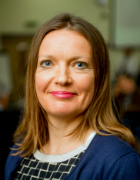 Caroline Norrie is Wandsworth Enter and View Representative and Researcher, Social Care Workforce Research Unit, KCL. (612 words)
Caroline Norrie is Wandsworth Enter and View Representative and Researcher, Social Care Workforce Research Unit, KCL. (612 words)
Public sector practitioners from across the Borough came together on 27 November, 2017 at the annual Wandsworth Safeguarding Conference – Working in Partnership, which took place in Wandsworth Civic Centre Town Hall.
The morning was dedicated to raising awareness of Modern Slavery and Human Trafficking. Attendees were informed about the high prevalence of modern slavery—the recruitment, transportation, transfer, harbouring or receipt of persons. Trafficking was defined as: the movement of people by means such as force, fraud or deception with the aim of exploiting them.
Tatiana Gren Jardan, Director of Strategy at the Office of the Independent Anti-Slavery Commissioner, discussed the role of local authorities in fighting modern slavery—and how staff may be able to identify cases in their everyday work. Tamara Barnett, from the Human Trafficking Foundation, then outlined the duties professionals have in identifying and supporting victims. Since the passing of the Modern Slavery Act 2015 specified public authorities (including Local Authorities) have a duty to report details of suspected cases of modern slavery to the Home Office. The National Referral Mechanism (NRM) framework can then be used (if an adult victim consents) with offering 45 days ‘reflection and recovery’ time for a victim to receive appropriate support.
Bronwen Powell, Detective Sergeant at the Community Safety Unit, Wandsworth Borough Metropolitan Police, described shocking cases of modern slavery and trafficking she had encountered, and advised attendees to be aware of the possible locations such as nail bars and pop-up car washes.
Take-home messages from the morning were that people may be threatened and coerced into slavery by many means—blackmailed over debts, threats to their family or removal of passports. Careful and sensitive questioning may give a victim the opportunity to speak out.
The afternoon was set aside for discussion of partnership working—many organisations had stalls which we visited over lunch with information from groups such as Wandsworth Carers, the Fire Brigade, Police, the CCG, and Refuge and Community Safety.
Dr Jennifer Storey, Lecturer in Criminology at Royal Holloway University opened the afternoon with a presentation on Domestic Violence and Older Adults. She noted that sometimes the pressures of caring for an older person have been used to ‘explain’ (and excuse) abusive behaviour towards an individual, but research has shown that most people who are abusive have pre-existing personal problems unrelated to their caring role.
Social Care Workforce Research Unit Director, Jill Manthorpe, discussed partnership working with people who self-neglect, an area of practice that is of growing interest following the Care Act 2014. Some cases of self-neglect might be taken up by adult safeguarding services, but overall there is a need to think about intervening carefully when a person is able to make their own decisions about how they want to live their life.
Nic Myatt from London Fire Brigade outlined recent facts and figures about the most common reasons for house fires and how to protect your home. He also discussed how vulnerable adults and single people are most likely to be involved in fires in their homes.
Finally, Lynn Wild, Head of Safeguarding and Professional Services, Adult Social Services, Richmond & Wandsworth Councils outlined the positives of multi-agency working across the two Boroughs and recent successes in preventing harm.
This was a useful day for attendees, the morning sessions were a chance to learn about an area that is new to many agencies. The afternoon sessions equally offered interesting insights into practice. The whole day was an impressive celebration of inter-agency working and an excellent opportunity for networking.
Caroline Norrie is Wandsworth Enter and View Representative and Researcher, Social Care Workforce Research Unit, KCL.